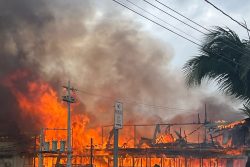Dear Editor,
To all African descendants of Guyana and the Caribbean, at home or elsewhere in the world, and to all Guyanese who value the significance of August 1, Emancipation Day, or who enjoy the holiday the WPA sends greetings of proud re-memory and of hope and determination to achieve despite difficulties freedom and prosperity. Our forbears who, mainly on their own strength and supported by social groups in the dominating country, succeeded in breaking out of enslavement of over two centuries here and in the rest of the Caribbean, altered the fate of human beings for all time. Cuffy, the 1763 revolutionary, had declared: “…but we shall not be slaves again.” That uprising was defeated, but the determination never to be slaves again has somehow become a sentiment, a principle and a resolve which has informed the psyche of almost every man, woman and child in Guyana from that time onwards. The dream of full human dignity did not fade. It must have become the bottom line for all segments and batches of indentured servants from various continents. It was always a backdrop and point of reference in the minds of leaders like Critchlow and Edun and their followers through the years of the struggle for trade union rights, a living wage, humane working conditions, women’s rights, education, against non representation, under representation, full adult suffrage, local self-government and independence.
The struggle against chattel slavery here as elsewhere has made it virtually impossible for exploiting groups to resort to it, although in various areas of the modern world they have resorted to new and subtle forms of bondage and subordination, especially in the formal and informal labour markets. It inspired the whole human rights ideology and philosophy which today is expressed in a wide network of voluntary, specialised and professional institutions, official and popular, and in an increasing complex of economic and social, civil and economic rights, including rights of the child and of the disabled. In the 1970s in the face of various pretences of paramountcy, it was Clive Thomas of the WPA who argued that so far as the Caribbean and the hemisphere were concerned the experience of indigenous genocide, of enslavement and of indenture had sharpened the freedom instincts and determined that an advanced society should endow not fewer rights but an expansion of human freedom.
As we face the issue of local government reform and note that both Victoria, the first village, and Buxton are at present seeking to retool their human and other resources, it is time to pay tribute to the village pioneers, who in the opinion of many laid the basis for human existence in communities on the coastland. It is time to note also that the indigenous people’s interior villages set the primary pattern of local government and that indentured Indians added to the experience of developing and sustaining villages as areas outside of plantation control.
The promise of August 1 Emancipation Day 1834 and 1838 is ultimately a promise of the human entitlement to freedom regardless of origin, or pre-existing status, regardless of race, gender, political, religious or other reference, orientation or conviction. To be true to the gains of Emancipation in the 21st century the WPA renews its pledge to the struggle for bread, justice, equality, inter-ethnic respect, gender equality and to the development of plans for economic expansion and prosperity in all areas of Guyana, urban, rural and hinterland, excepting none.
Yours faithfully,
David Hinds
Working People’s Alliance (WPA)








